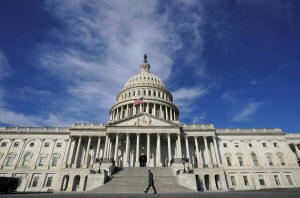U.S. Senate works through the night to advance $1.9 trillion COVID-19
bill
 Send a link to a friend
Send a link to a friend
 [March 06, 2021]
By Makini Brice and David Morgan [March 06, 2021]
By Makini Brice and David Morgan
WASHINGTON (Reuters) - The U.S. Senate
worked through the night into Saturday to advance $1.9 trillion
coronavirus relief plan in a marathon session involving more than a
dozen votes and hours of closed-door negotiations.
Democrats who narrowly control the chamber agreed to scale back aid to
the millions who have lost their jobs in the crisis. As Friday night
turned to Saturday morning, they stuck together to turn back Republican
attempts to modify the bill, which according to the Congressional Budget
Office would be the largest stimulus package ever.
With Republicans united in opposition, Democrats must keep all 50 of
their members on board in order to pass the package, as they hope to do
this weekend.

They were tested several times on Friday, as Democrats split over an
effort to raise the minimum wage. The Senate set a record for its
longest single vote in the modern era -- 11 hours and 50 minutes -- as
Democrats negotiated a compromise on unemployment benefits to satisfy
centrists like Senator Joe Manchin, who worried the massive package
might overheat the economy.
With that resolved, senators then began working through hundreds of
proposals to modify the bill.
Democrats voted down Republican proposals to modify how money would have
been distributed to schools, state governments, transit systems and
farmers. Republicans were one vote down after Senator Dan Sullivan left
Washington to go to Alaska for a family funeral.
The largest public health crisis in a century has killed more than
521,000 people in the United States, thrown millions out of work and
upended most aspects of American life.
The relief legislation includes funding for vaccines and medical
supplies, extends jobless assistance and provides a new round of
emergency financial aid to households, small businesses and state and
local governments.
Opinion polls indicate broad public support for the package.
Democrats hope to get it to Biden to sign into law before some current
benefits expire on March 14.
[to top of second column]
|

A man makes his way past the U.S. Capitol on the day the House of
Representatives is expected to vote on legislation to provide $1.9
trillion in new coronavirus relief in Washington, U.S., February 26,
2021. REUTERS/Kevin Lamarque

FRICTION POINTS
Unemployment aid is just one of many friction points in the sweeping
bill. Democrats had earlier modified the bill to steer more aid to
smaller states and cities.
The version passed by the House of Representatives last Saturday
calls for $400 per week in jobless benefits through Aug. 29, on top
of state benefits, to help Americans who have lost jobs amid the
pandemic.
The compromise would lower that weekly benefit to $300, but extend
it through Sept. 6, according to a Democratic aide. It would waive
taxes on the first $10,200 in aid that jobless people received last
year.
The agreement also extends a tax break for businesses for an
additional year through 2026.
Biden supports the compromise, the White House said.
If the Senate passes the bill, the House would have to sign off on
those changes before Biden could sign it into law.
Republicans have broadly supported previous stimulus packages to
fight the virus and revive the economy. But with Democrats in charge
of the White House and both chambers of Congress, they have
criticized this bill as too expensive.

The country has yet to replace 9.5 million jobs lost since last year
and the White House says it could take years to do so.
Washington got unexpected good news on Friday after data showed that
U.S. employment surged in February, adding 379,000 jobs,
significantly higher than many economists had expected.
(Writing by Andy Sullivan; Editing by Scott Malone, Jacqueline Wong,
Alexander Smith and Frances Kerry)
[© 2021 Thomson Reuters. All rights
reserved.] Copyright 2021 Reuters. All rights reserved. This material may not be published,
broadcast, rewritten or redistributed.
Thompson Reuters is solely responsible for this content. |